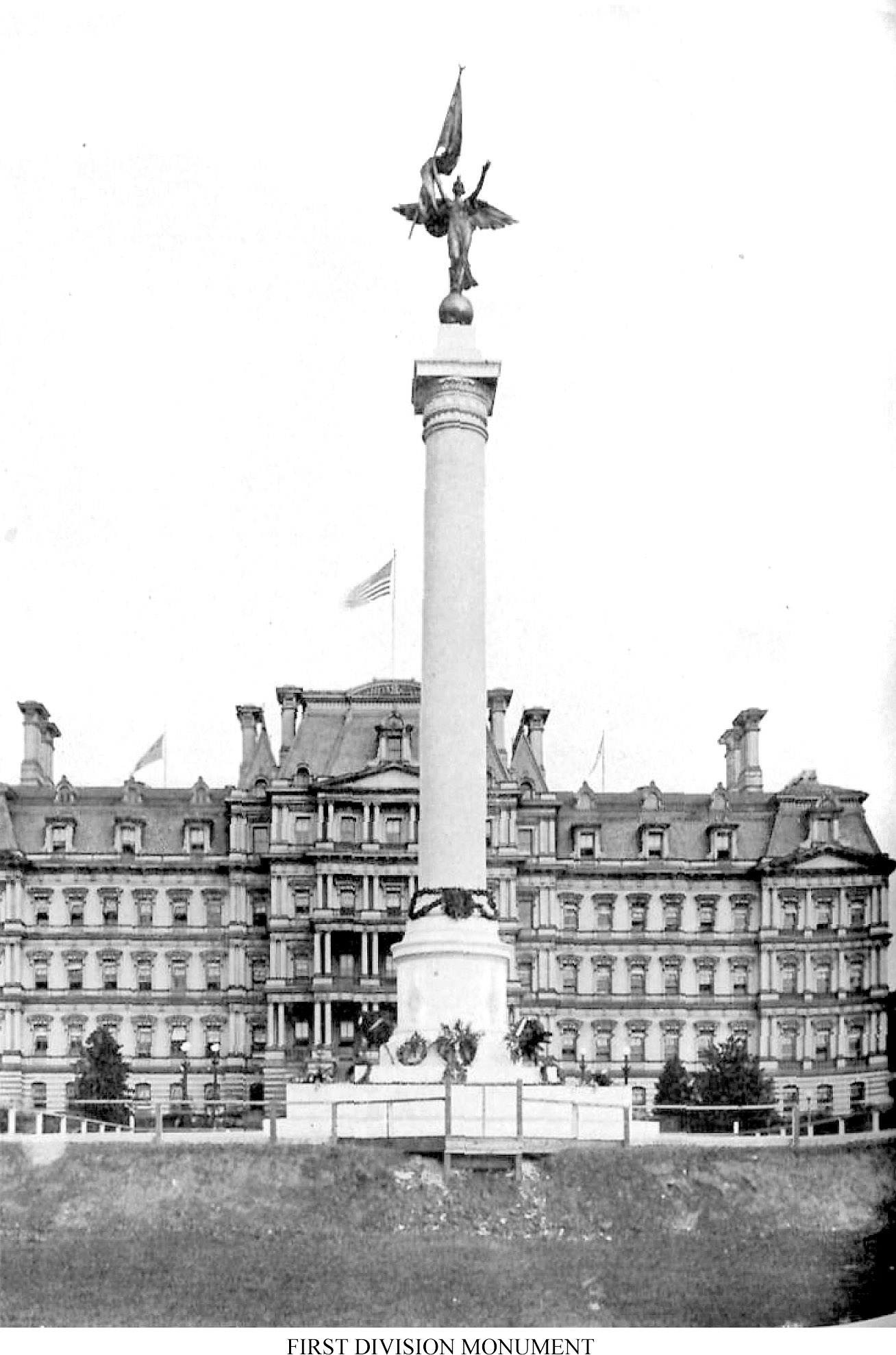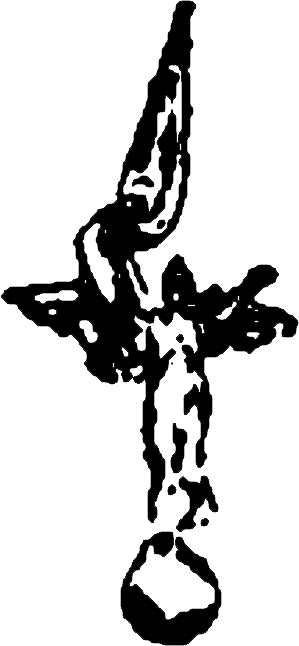
The purpose of this monument is to preserve the memory of the men who gave their lives for their country in the First Division during the World War and to bequeath to our people the inspiration of the spirit that actuated them in their heroism and sacrifice.
It is a popular practice at present to inveigh against war and to condemn its evils and those who participate in it alike as enemies to humanity. While its horrors are to be deplored beyond almost all other calamities, those who condemn it unreservedly are uninitiated in the spiritual attributes that it discloses in the men who devote their lives to the call of duty, honor and country.
War has come to our people only when the agencies of peace have failed, and its sole object has been the restoration of peace. Thus its mission is one of the highest obligations of civilization. It is the supreme test of the physical and spiritual qualities of man, and it demands for its sacrifices only the best. It lifts men above the sordid and selfish things of life as nothing else save martyrdom has ever done, and it reveals in the soldier as in the martyr those divine attributes that the Maker gave when He created man in His own image. To endure hardship, danger and death for one's country and one's people, to fight for their faith and their ideals and to defend the weak, the home and the loved ones requires not only courage, but consecration of the body and exaltation of the soul that make war in a righteous cause a holy thing, and battle an expiation.
Viewed from this lofty ideal the career of the First Division was providential in its progress and growth to meet the ever-increasing demands that lay before it from the selection of its elements along the Texas border to the cessation of hostilities. Under the skilful convoy of the American Navy, it made the initial crossing of the submarine infested seas and carried the visible proof of aid to the sorely pressed Allies. Trained within sound of the enemies' guns, it came early to a realization of the part that it was destined to bear, and stoically endured the hardships and privations inseparable from the rigors of the climate and the exactions of discipline. Thus, even before it was called upon to bear the shock of battle, it had developed fortitude and self-sacrificing devotion to duty. In the trenches of Lorraine and Picardy its courage and self-reliance were tested, and loyalty to every obligation became almost a religion. At Cantigny it proved its fighting qualities to friend and foe alike and heartened our countrymen by the knowledge that the America of Bunker Hill and Gettysburg was the America of the battlefields of France. When thrown into the desperate fighting at Soissons, where it could reach the position only by almost superhuman effort, there were added the sublime resolution and selflessness that alone could have changed the tide of battle on that decisive field. In the grim and haggard faces of the remnants who returned from this glorious victory there shone the exultation of triumph that was to crown the brilliant advance at St. Mihiel and the irresistible onslaughts on the Meuse-Argonne.
In all of its vicissitudes the Division never complained of its lot. It never asked to be relieved and it never failed to take its objectives and to hold the ground it had won. The bodies of its dead were ever behind its fighting lines and no enemy's hand ever gave them burial. It was eager to respond, however difficult the task; and whatever the obstacles, it took pride in executing its missions according to schedule. There was mutual confidence and comradeship in all ranks and elements and it attained to the highest ideal of a fighting command.
The resolution and unconquerable spirit of the veterans spread to the thousands of recruits who came to replace the losses after each battle. All knew the sacredness of their mission and the responsibilities that rested upon them to do their part in bringing victory to our arms and peace to the world. They fought from pride in their regiments and the Division, from self-respect and from loyalty to their comrades and their leaders. They dedicated their powers and their lives to their tasks with renunciation of whatever else was held dear. They hoped for victory and resolved to achieve it, but they cherished no illusions as to the price that they must pay. In the face of staggering losses and with their dead and wounded comrades about them, they never wavered nor became disheartened. The men in the foremost line were always the most cheerful. Their self-control and calm courage added to the fierceness of their assaults and their spiritual endurances sustained them when physical exhaustion and pain overcame their bodies. Quietly and unquestioningly they met each situation, whether it was an order to renew the attack with pitifully depleted ranks or the spectacle of their neighbors. being relieved when there was no relief for them.
It was their pride that they were worthy of being selected for the most difficult posts in the line and that they went where they were needed most. Confident of themselves and possessing the confidence of their leaders, each man was determined not to let the prestige of his command suffer through any act of his.
The first to go, and the last to return, the Division constituted a great instrumentality for doing the Nation's will. Today its veterans in every part of the land are maintaining the ideals of their old command as patriotic and industrious citizens. The fortitude and courage of our wounded challenge admiration and gratitude. The members of the active Division wearing the insignia and the emblems of valor are worthily upholding the traditions created by the living and the dead. They are a priceless asset for the stability of our institutions, and for the preservation of the peace that those who preceded them in its ranks helped so abundantly to win.
No tribute to the soldierly virtues of the young American manhood who composed the Division would be complete without a recognition of the sources of its inspiration. The mothers who sent their sons to serve, with pride that they could make such an offering in the Nation's hour of need and who have borne bravely heartache and bereavement by thousands, are the ones to whom the country is most indebted for whatever its soldiers have accomplished. The mother's words were ever in the ears of the fighting men. The mother's love was ever the most precious treasure in life and the mother's brave and uncomplaining spirit lived in the hearts of the men who knew how to fight, to suffer and to die.
Though the bodies of our dead are scattered from the cemeteries of France to the uttermost part of our land, this monument will ever remain a shrine wherein their memory and their spirit dwell. It cannot fail to bear a message of helpfulness to all who behold it. It cannot fail to glorify service, to sanctify sacrifice and to honor triumph. These were the attributes that led 5586 men of the First Division to lay down their lives; more than 18,000 to suffer wounds, and many more thousands to endure hardship and danger and to offer Iife, even though it was not taken. Their richest and the only reward of most of them, save that of the consciousness of duty well done, is the encomium of their great leader, who knew better than anyone else the measure of their deserts when he said:
“The Commander-in-Chief has noted in this Division a special pride of service and a high state of morale, never broken by hardship nor battle.”
There is more than passing significance in the roll call of our dead, which contains the names of sons of every state, territory and possession under our flag. It is a realization of the vision of our greatest patriot and martyr, when he said:
“The mystic chords of memory stretching from every battlefield and every patriot grave to every living heart and hearthstone all over this broad land, will yet swell the chorus of the Union when touched again, as they surely will be, by the better angels of our nature.”
This chorus must ever resound from chords of memory multiplied by sacrifices of which he could not dream.
Today we have fulfilled the pledge made to our fallen comrades. Let us not here after fail to keep the faith for which they died. May the infinite God in the mysteries of His grace, waft to their spirits the message that their sacrifices have not been forgotten and that their deeds will live to strengthen the hearts of all who come after them in whatever hours of trial may yet await our beloved land.
The winds blow in from eastward, mist laden, reeking brine,
And out o' the ocean's ending—uplifting line on line—
All faint at first but nearer—though naught of sound we hear—
Roll forth the proud battalions who never met a peer.
The tread of tramping thousands falls gently as the dew—
The great guns lunge triumphant in menacing review:
The Phantom First is passing!—A glorious, gleaming host—
This is their only homing to those they loved the most.
Each brow aglow and following where high the Great Flag flies—
But oh the wondrous fires that light the ghostly eyes.
Infrangible, intangible—as serried northern pines,
Horizon to horizon proud lift the far-flung lines.
Earth of the earth in power—air of the air in tread—
Sweep on in a blaze of glory the ranks of the deathless dead.
And a heritage of valor, of faith and loyal flame
Shalt wrap in a cloak of honor a Land's immortal name.
(Written by Erwin Clarkson Garrett, Co. G.,
16th Infantry, First Division, A. E. F.)

 And it was printed in:
And it was printed in: